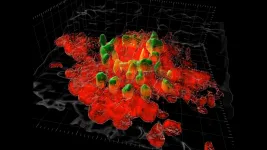African American breast cancer survivor cardiovascular disease risk high but knowledge low
New research led by George Mason University's College of Health and Human Services faculty Dr. Michelle Williams found that although African American breast cancer survivors have a higher prevalence of CVD risk factors, their knowledge about CVD is low
2021-03-05
(Press-News.org) African American breast cancer survivors are four times more likely to die from breast cancer than women of all other races and ethnicities, and they have a disproportionately high rate of death from cardiovascular disease (CVD).
New research led by George Mason University's College of Health and Human Services faculty Dr. Michelle Williams assessed African American breast cancer survivors' risk factors and knowledge about CVD in the Deep South, where health disparities between African American women and women of other races is even larger. They found that although African American breast cancer survivors have a higher prevalence of CVD risk factors, their knowledge about CVD is low.
The study was published in the Journal of Health Disparities Research and Practice in February.
Specifically, participants scored low on knowledge about heart attack symptoms and CVD-related medical information. Participants with healthier diets and higher levels of education had higher levels of CVD knowledge.
"We know that several CVD risk factors, such as hypertension and obesity, can be modified through lifestyle behavior changes," adds Williams. "This is promising, but breast cancer survivors must be better informed about CVD risk by their health care providers."
Their study included surveys of 70 breast cancer survivors who identified as African American or Black in Mississippi, Alabama, Tennessee, Louisiana, and Georgia.
"Our findings highlight the importance of informing African American breast cancer survivors about their increased risk for co-morbidities such as CVD and providing them with access to culturally appropriate CVD risk reduction interventions aimed at a variety of education levels," explains Williams.
Williams and colleagues are currently conducting the next phase of the study, which will provide more in-depth information about CVD risk factors among African American breast cancer survivors.
INFORMATION:
This research was supported by a grant from the Mississippi Center for Clinical and Translational Research to the University of Mississippi Medical Center (Grant Number U54 GM115428).
About George Mason University
George Mason University is Virginia's largest and most diverse public research university. Located near Washington, D.C., Mason enrolls 39,000 students from 130 countries and all 50 states. Mason has grown rapidly over the past half-century and is recognized for its innovation and entrepreneurship, remarkable diversity and commitment to accessibility. For more information, visit https://www2.gmu.edu/.
About the College of Health and Human Services
George Mason University's College of Health and Human Services prepares students to become leaders and shape the public's health through academic excellence, research of consequence, community outreach, and interprofessional clinical practice. George Mason is the fastest-growing Research I institution in the country. The College enrolls more than 1,900 undergraduate and 1,370 graduate students in its nationally-recognized offerings, including: 5 undergraduate degrees, 13 graduate degrees, and 7 certificate programs. The college is transitioning to a college of public health in the near future. For more information, visit https://chhs.gmu.edu/.
[Attachments] See images for this press release:

ELSE PRESS RELEASES FROM THIS DATE:
2021-03-05
UPTON, NY—Physicists studying collisions of gold ions at the Relativistic Heavy Ion Collider (RHIC), a U.S. Department of Energy Office of Science user facility for nuclear physics research at DOE’s Brookhaven National Laboratory, are embarking on a journey through the phases of nuclear matter—the stuff that makes up the nuclei of all the visible matter in our universe. A new analysis of collisions conducted at different energies shows tantalizing signs of a critical point—a change in the way that quarks and gluons, the building blocks of protons and neutrons, transform from one phase to another. The findings, just published by RHIC’s STAR Collaboration in the journal Physical ...
2021-03-05
Patients can spend up to six years waiting for a kidney transplant. Even when they do receive a transplant, up to 20 percent of patients will experience rejection. Transplant rejection occurs when a recipient's immune cells recognize the newly received kidney as a foreign organ and refuse to accept the donor's antigens. Current methods for testing for kidney rejection include invasive biopsy procedures, causing patients to stay in the hospital for multiple days. A study by investigators from Brigham and Women's Hospital and Exosome Diagnostics proposes a new, noninvasive ...
2021-03-05
BIRMINGHAM, Ala. - Studies of the microbiome in the human gut focus mainly on bacteria. Other microbes that are also present in the gut -- viruses, protists, archaea and fungi -- have been largely overlooked.
New research in mice now points to a significant role for fungi in the intestine -- the communities of molds and yeasts known as the mycobiome -- that are the active interface between the host and their diet.
"We showed that the gut mycobiome of healthy mice was shaped by the environment, including diet, and that it significantly correlated with metabolic outcomes," said Kent Willis, M.D., an assistant professor at the University of Alabama at Birmingham and co-corresponding author of the study, published in the journal Communications Biology. "Our results ...
2021-03-05
JUPITER, FL -- In 1993, scientists discovered that a single mutated gene, HTT, caused Huntington's disease, raising high hopes for a quick cure. Yet today, there's still no approved treatment.
One difficulty has been a limited understanding of how the mutant huntingtin protein sets off brain cell death, says neuroscientist Srinivasa Subramaniam, PhD, of Scripps Research, Florida. In a new study published in Nature Communications on Friday, Subramaniam's group has shown that the mutated huntingtin protein slows brain cells' protein-building machines, called ribosomes.
"The ribosome has to keep moving along to build the proteins, but in Huntington's disease, the ribosome is slowed," Subramaniam says. "The difference may be two, three, four-fold ...
2021-03-05
The body is amazing at healing itself. However, sometimes it can overdo it. Excess scarring after abdominal and pelvic surgery within the peritoneal cavity can lead to serious complications and sometimes death. The peritoneal cavity has a protective lining containing organs within our abdomen. It also contains fluid to keep the organs lubricated. When the lining gets damaged, tissue and scarring can form, creating problems. Researchers at the University of Calgary and University of Bern, Switzerland, have discovered what's causing the excess scarring and options to try to prevent it.
"This is a worldwide concern. Complications from these peritoneal adhesions cause pain and can lead to life-threatening small bowel obstruction, and infertility in women," says Dr. Joel Zindel, MD, University ...
2021-03-05
Researchers at Indiana University School of Medicine have successfully reprogrammed a glial cell type in the central nervous system into new neurons to promote recovery after spinal cord injury--revealing an untapped potential to leverage the cell for regenerative medicine.
The group of investigators published their findings March 5 in Cell Stem Cell. This is the first time scientists have reported modifying a NG2 glia--a type of supporting cell in the central nervous system--into functional neurons after spinal cord injury, said Wei Wu, PhD, research associate in neurological surgery at IU School of Medicine and co-first author of the ...
2021-03-05
PULLMAN, Wash. - The ability to identify misinformation only benefits people who have some skepticism toward social media, according to a new study from Washington State University.
Researchers found that people with a strong trust in information found on social media sites were more likely to believe conspiracies, which falsely explain significant events as part of a secret evil plot, even if they could identify other types of misinformation. The study, published in the journal Public Understanding of Science on March 5, showed this held true for beliefs in older conspiracy theories as well as newer ones around COVID-19.
"There was some ...
2021-03-05
Boulder, Colo., USA: In its large caldera, Newberry volcano (Oregon, USA) has two small volcanic lakes, one fed by volcanic geothermal fluids (Paulina Lake) and one by gases (East Lake). These popular fishing grounds are small windows into a large underlying reservoir of hydrothermal fluids, releasing carbon dioxide (CO2) and hydrogen sulfide (H2S) with minor mercury (Hg) and methane into East Lake.
What happens to all that CO2 after it enters the bottom waters of the lake, and how do these volcanic gases influence the lake ecosystem? Some lakes fed by volcanic CO2 have seen catastrophic ...
2021-03-05
Research over the last decade has shown that loneliness is an important determinant of health. It is associated with considerable physical and mental health risks and increased mortality. Previous studies have also shown that wisdom could serve as a protective factor against loneliness. This inverse relationship between loneliness and wisdom may be based in different brain processes.
In a study published in the March 5, 2021 online edition of Cerebral Cortex, researchers at University of California San Diego School of Medicine found that specific regions of the brain respond to emotional stimuli related to loneliness and wisdom in opposing ways.
"We were interested ...
2021-03-05
DURHAM, N.C. -- When you think about what separates humans from chimpanzees and other apes, you might think of our big brains, or the fact that we get around on two legs rather than four. But we have another distinguishing feature: water efficiency.
That's the take-home of a new study that, for the first time, measures precisely how much water humans lose and replace each day compared with our closest living animal relatives.
Our bodies are constantly losing water: when we sweat, go to the bathroom, even when we breathe. That water needs to be replenished to keep blood volume and other body fluids within normal ranges.
And yet, research published March 5 in the journal Current Biology shows that the human body uses 30% to 50% less water per ...
LAST 30 PRESS RELEASES:
[Press-News.org] African American breast cancer survivor cardiovascular disease risk high but knowledge low
New research led by George Mason University's College of Health and Human Services faculty Dr. Michelle Williams found that although African American breast cancer survivors have a higher prevalence of CVD risk factors, their knowledge about CVD is low






